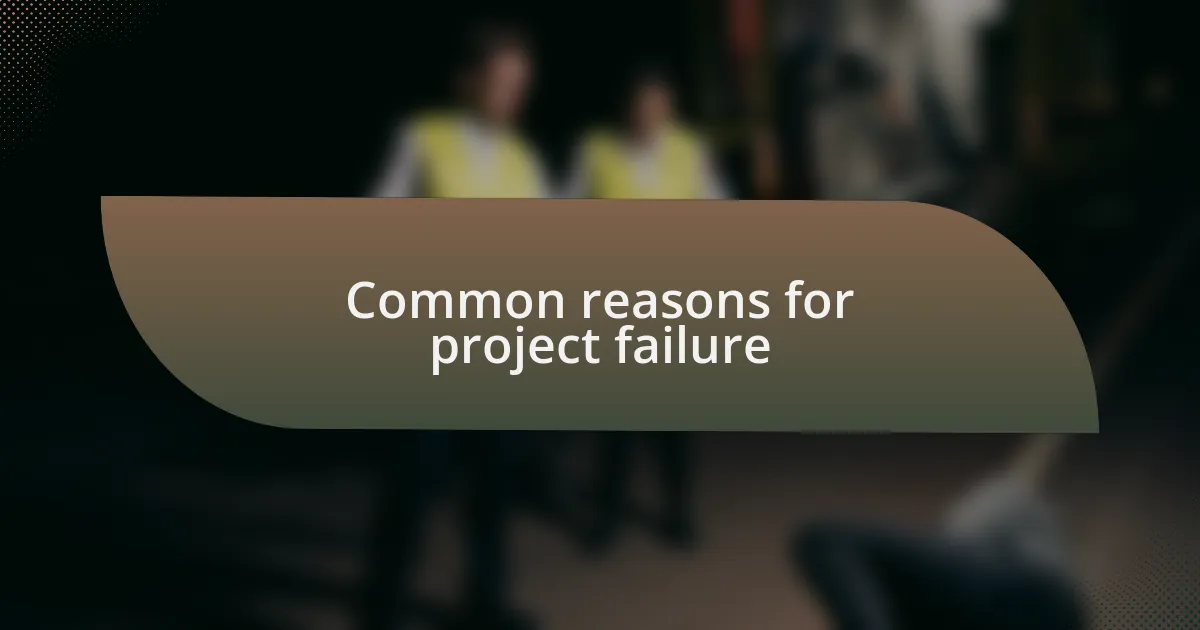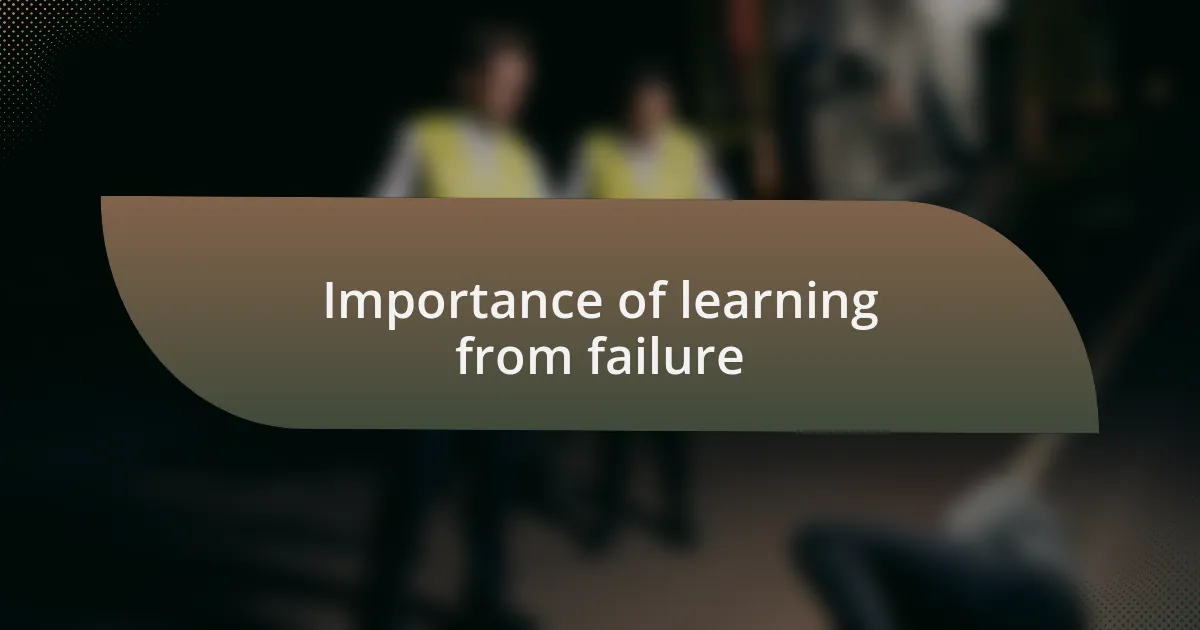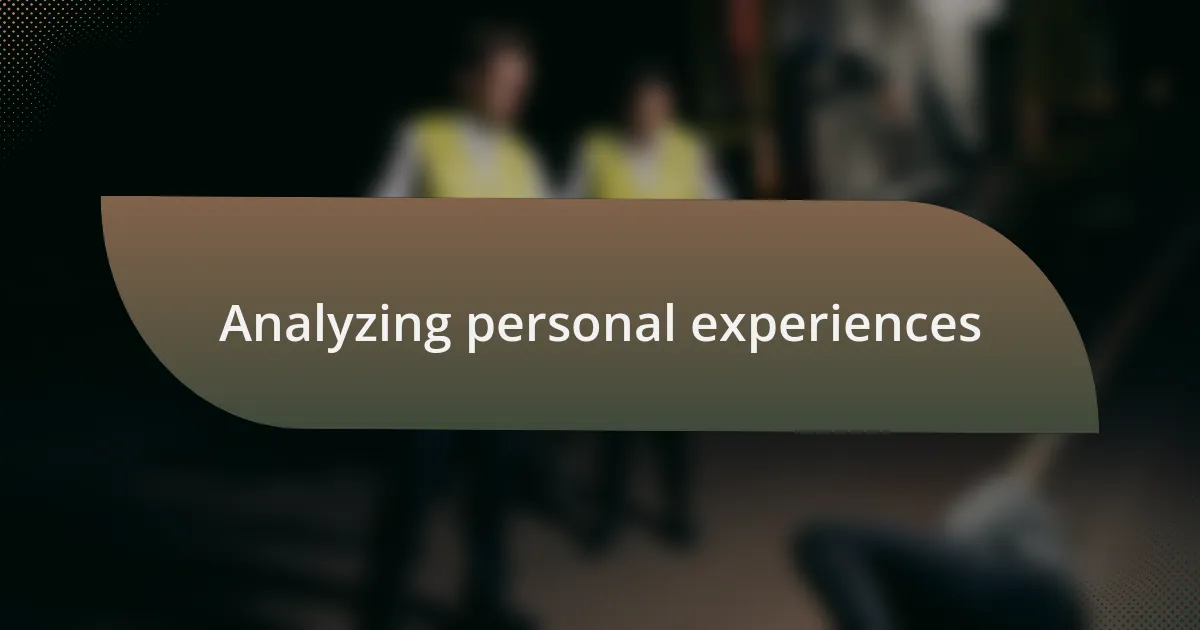Key takeaways:
- Effective communication and stakeholder involvement are critical to project success, preventing mismatches between expectations and deliverables.
- Learning from failure fosters resilience and helps to improve team dynamics, leading to a culture of openness and continuous improvement.
- Establishing realistic goals and feedback loops throughout the project lifecycle can enhance motivation and facilitate timely adjustments, ultimately saving time and resources.
- Integrating risk assessment and adopting a flexible mindset are essential strategies for adapting to challenges and achieving successful outcomes in future projects.

Understanding failed projects
Understanding failed projects often requires a deep dive into the factors that led to their downfall. I recall a project where the team rushed into development without clear requirements, and it ended in chaos. Have you ever experienced that moment when you realize the foundation of your work doesn’t match the initial vision? It’s frustrating, isn’t it?
These experiences often reveal the critical importance of communication and stakeholder involvement. In another project, we overlooked regular check-ins with the client, which resulted in significant mismatches between expectations and deliverables. That scenario taught me how vital it is to ensure everyone is on the same page—don’t you think regular updates might have changed the course of that project?
Moreover, the emotional toll of failure can be quite profound. I remember feeling disheartened when a project I dedicated months to didn’t meet expectations. It makes you question your skills and decisions. But reflecting on these setbacks can provide invaluable insights; what can we learn from our missteps? Recognizing patterns in past failures can help us build a more resilient framework for future success.

Common reasons for project failure
One of the most prevalent reasons for project failure is poor planning. I once jumped straight into coding without adequately mapping the project scope or timeline. The result? We encountered endless reworks and missed deadlines. It felt like trying to run a marathon with no training—exhausting and disheartening. Have you ever found yourself in a similar situation where the lack of foresight left you scrambling?
Another significant factor is inadequate resource management. In one project, we didn’t account for the necessary skill sets within our team, leading to a glaring gap during implementation. This oversight not only delayed progress but also created tension among team members. It really made me question how crucial it is to align abilities with tasks. Isn’t it interesting how the right mix of skills can make or break a project?
Lastly, a lack of adaptability can be detrimental. I remember a project that faltered because we were too rigid in our approach, resisting changes despite clear signs they were needed. It’s a lesson learned: being open to feedback and willing to pivot can make all the difference. Have you ever clutched tightly to a plan only to find that a little flexibility would have turned things around?

Importance of learning from failure
Learning from failure is crucial in software development because it transforms setbacks into stepping stones. I vividly recall a project where everything went wrong due to overconfidence. We thought we had all the answers, but when the product launched, it was riddled with issues and user complaints. That experience taught me humility and the importance of continuous learning. Can you imagine the thrill of turning what felt like a disaster into a valuable lesson?
Every failure serves as a mirror, reflecting not just what went wrong, but also how our processes can improve. One time, after a project failure, we conducted a retrospective meeting, and the insights gained were part of our team’s evolution. It felt like peeling an onion, revealing layers of ineffective communication and assumptions. Has there been a moment in your career when analyzing a failure opened your eyes to possibilities you hadn’t considered before?
Embracing failure fosters resilience, and I’ve seen firsthand how it cultivates a healthier team culture. In one instance, we all felt discouraged after a product’s underwhelming performance. Instead of pointing fingers, we rallied together, sharing our thoughts and feelings about the experience. That honesty not only brought us closer as a team but reignited our passion for innovation. Isn’t it empowering to know that some of the best breakthroughs arise from the ashes of failure?

Analyzing personal experiences
Analyzing personal experiences often reveals deeper insights than we initially acknowledge. For instance, during a particularly challenging project, I found myself frustrated by the number of miscommunications that led to our downfall. It became clear that we had overlooked the importance of fostering open dialogue. Reflecting on that experience made me realize how powerful clear communication could be, and I now prioritize establishing communication channels right from the start.
I remember a project timeline that spiraled out of control because I underestimated the complexity involved. Looking back, I can see that my lack of thorough research was a critical factor in our failure. This sparked a crucial change in my approach—I now invest more time in the planning phase, carefully dissecting all potential pitfalls. Have you ever underestimated a project’s complexity and faced unexpected challenges? It’s humbling, isn’t it?
The emotions tied to failed projects can be intense and revealing. After one setback, I felt a mix of embarrassment and frustration, but that pain led me to seek feedback actively from my peers. Hearing their perspectives was invaluable, as it not only helped me grow but also created a culture of openness where everyone felt comfortable sharing their experiences. This self-reflection made me realize how essential it is to seek external viewpoints to enhance personal growth. How often do you take the time to gather feedback after a setback?

Strategies for future success
Developing effective strategies for future success is crucial after encountering setbacks. One lesson I learned was the importance of setting realistic goals. I recall a project where we aimed for an ambitious feature rollout, but our timelines were more wishful thinking than practical planning. By breaking down projects into manageable phases, I’ve found we can celebrate small victories, which keeps the team motivated and aligned. Have you noticed how incremental progress not only builds confidence but also provides valuable insights along the way?
An essential strategy I’ve adopted is to establish a feedback loop throughout the project lifecycle. Early in my career, I worked on a software that was nearly complete before we tested it, only to uncover significant bugs and usability issues at the last minute. That experience taught me to prioritize continuous testing and iterative improvements, which ultimately saved time and resources. How often do you check in on your project’s progress instead of waiting until the end?
Moreover, I’ve embraced the concept of post-mortem meetings. After a major project fell short of expectations, our team gathered to dissect what went wrong and, more importantly, what we could learn from it. This collaborative environment fostered trust and encouraged open communication. Have you ever sat down with your team to reflect on a project? Those conversations can lead to invaluable insights that pave the way for future success.

Applying lessons to new projects
When it comes to applying lessons learned from failed projects, one of my biggest takeaways has been the significance of fostering a culture of psychological safety within the team. During a project that went terribly awry, I remember a pivotal moment when one team member hesitated to voice concerns about our direction, fearing backlash. That experience opened my eyes to the fact that encouraging open dialogue not only helps in catching potential pitfalls early but also empowers everyone to share their unique perspectives. How often do team dynamics influence the outcomes of a project?
Adopting a flexible mindset has also proven invaluable as I embark on new initiatives. In a past project, we rigidly stuck to an original plan despite clear signs that it wasn’t resonating with users. It wasn’t until we revisited our approach based on user feedback that we turned the project around. This taught me that adaptability is not a weakness but a strength—how many times have you pivoted based on new information, only to find it leads to greater success?
In my experience, integrating risk assessment into the planning phases can significantly shape project outcomes for the better. After a particularly challenging endeavor where we faced unforeseen technical challenges, I realized that we hadn’t adequately considered potential risks from the beginning. Now, I make it a point to conduct thorough risk evaluations, involving the team in brainstorming sessions. This proactive approach not only prepares us for possible hurdles but also boosts our collective confidence. Have you ever felt the relief that comes from being better prepared?